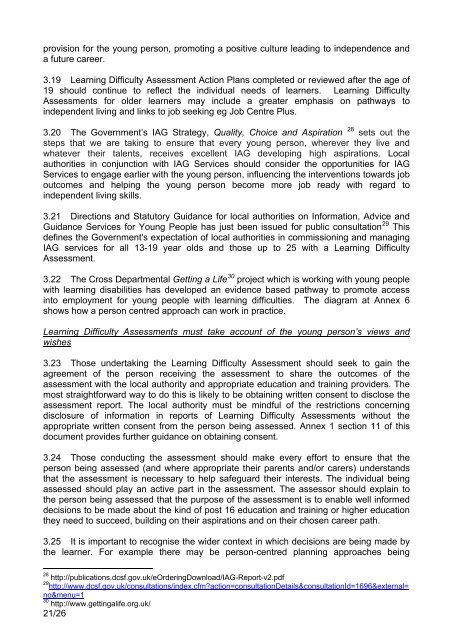Supporting young people with learning difficulties to participate and ...
Supporting young people with learning difficulties to participate and ...
Supporting young people with learning difficulties to participate and ...
Create successful ePaper yourself
Turn your PDF publications into a flip-book with our unique Google optimized e-Paper software.
provision for the <strong>young</strong> person, promoting a positive culture leading <strong>to</strong> independence <strong>and</strong><br />
a future career.<br />
3.19 Learning Difficulty Assessment Action Plans completed or reviewed after the age of<br />
19 should continue <strong>to</strong> reflect the individual needs of learners. Learning Difficulty<br />
Assessments for older learners may include a greater emphasis on pathways <strong>to</strong><br />
independent living <strong>and</strong> links <strong>to</strong> job seeking eg Job Centre Plus.<br />
3.20 The Government’s IAG Strategy, Quality, Choice <strong>and</strong> Aspiration 28 sets out the<br />
steps that we are taking <strong>to</strong> ensure that every <strong>young</strong> person, wherever they live <strong>and</strong><br />
whatever their talents, receives excellent IAG developing high aspirations. Local<br />
authorities in conjunction <strong>with</strong> IAG Services should consider the opportunities for IAG<br />
Services <strong>to</strong> engage earlier <strong>with</strong> the <strong>young</strong> person, influencing the interventions <strong>to</strong>wards job<br />
outcomes <strong>and</strong> helping the <strong>young</strong> person become more job ready <strong>with</strong> regard <strong>to</strong><br />
independent living skills.<br />
3.21 Directions <strong>and</strong> Statu<strong>to</strong>ry Guidance for local authorities on Information, Advice <strong>and</strong><br />
29<br />
Guidance Services for Young People has just been issued for public consultation This<br />
defines the Government's expectation of local authorities in commissioning <strong>and</strong> managing<br />
IAG services for all 13-19 year olds <strong>and</strong> those up <strong>to</strong> 25 <strong>with</strong> a Learning Difficulty<br />
Assessment.<br />
3.22 The Cross Departmental Getting a Life<br />
30 project which is working <strong>with</strong> <strong>young</strong> <strong>people</strong><br />
<strong>with</strong> <strong>learning</strong> disabilities has developed an evidence based pathway <strong>to</strong> promote access<br />
in<strong>to</strong> employment for <strong>young</strong> <strong>people</strong> <strong>with</strong> <strong>learning</strong> <strong>difficulties</strong>. The diagram at Annex 6<br />
shows how a person centred approach can work in practice.<br />
Learning Difficulty Assessments must take account of the <strong>young</strong> person’s views <strong>and</strong><br />
wishes<br />
3.23 Those undertaking the Learning Difficulty Assessment should seek <strong>to</strong> gain the<br />
agreement of the person receiving the assessment <strong>to</strong> share the outcomes of the<br />
assessment <strong>with</strong> the local authority <strong>and</strong> appropriate education <strong>and</strong> training providers. The<br />
most straightforward way <strong>to</strong> do this is likely <strong>to</strong> be obtaining written consent <strong>to</strong> disclose the<br />
assessment report. The local authority must be mindful of the restrictions concerning<br />
disclosure of information in reports of Learning Difficulty Assessments <strong>with</strong>out the<br />
appropriate written consent from the person being assessed. Annex 1 section 11 of this<br />
document provides further guidance on obtaining consent.<br />
3.24 Those conducting the assessment should make every effort <strong>to</strong> ensure that the<br />
person being assessed (<strong>and</strong> where appropriate their parents <strong>and</strong>/or carers) underst<strong>and</strong>s<br />
that the assessment is necessary <strong>to</strong> help safeguard their interests. The individual being<br />
assessed should play an active part in the assessment. The assessor should explain <strong>to</strong><br />
the person being assessed that the purpose of the assessment is <strong>to</strong> enable well informed<br />
decisions <strong>to</strong> be made about the kind of post 16 education <strong>and</strong> training or higher education<br />
they need <strong>to</strong> succeed, building on their aspirations <strong>and</strong> on their chosen career path.<br />
3.25 It is important <strong>to</strong> recognise the wider context in which decisions are being made by<br />
the learner. For example there may be person-centred planning approaches being<br />
28 http://publications.dcsf.gov.uk/eOrderingDownload/IAG-Report-v2.pdf<br />
29 http://www.dcsf.gov.uk/consultations/index.cfm?action=consultationDetails&consultationId=1696&external=<br />
no&menu=1<br />
30 http://www.gettingalife.org.uk/<br />
21/26
















